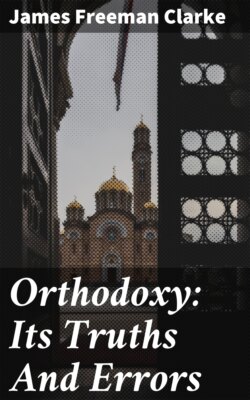Читать книгу Orthodoxy: Its Truths And Errors - James Freeman Clarke - Страница 35
На сайте Литреса книга снята с продажи.
§ 6. But Orthodoxy is right in maintaining their Reality as Historic Facts.
ОглавлениеTable of Contents
The first thing we notice about the miracles of Jesus is, that they are intertwined inextricably with the whole narrative. It is almost impossible to disentangle them, and to leave any solid historic residuum. There is a story in Goethe of a statue of iron and silver, with veins of gold. The flames licked out the gold veins of the colossus, and it remained standing a little while; but when at last the tenderest filaments had been licked out, the image crashed together, and fell in a shapeless, miserable heap. So when the tongue of criticism shall have eaten out the supernatural elements of the gospel narrative, the heroic figure will fall, [pg 075] as it has already in Renan's construction, into an amorphous mass of unhistoric rubbish.
Then we see that most of these miracles are miracles of healing, which have their analogues in many similar events scattered through history. Many such facts might be collected to show that there is in man a latent power of overcoming disease, in himself and others, by a great exertion of will. If in common men there is such a power, latent, and as yet undeveloped, why should it be an unnatural thing that one so full of a superhuman life as Jesus should be raised to a position where, by his very word or touch, he could cure disease, and that even at a distance?
We see such wonderful discoveries made every day of latent powers in nature, and secrets hidden till now from all men, that we do not know where to put limits to the possibility of the wonderful. To go into a telegraphic office in Boston, and speak to a man in New York or Washington, and have an answer in five minutes; to have your portrait painted in a moment by the rays of the sun—such things as these would have seemed miracles to us a few years ago. To be able to tell what metals there are in the sun's atmosphere, and what not there; to say, “In the atmosphere of the sun there is silver, but not gold; there are iron, and antimony, and lead, and aluminum, but no copper nor zinc,”—does not this seem incredible? But we know that we can now tell just that.
When we read the Gospels, we find everything in them so simple, so unpretending, so little of an attempt at making out a consistent story, such a harmony in the character of the works attributed to Jesus (with one or two exceptions), that we are irresistibly inclined to say, “These stories must be simple facts. Delusion never spoke in this tone—so clear, so luminous—in language so honest and sincere.”
I do not deny that some mistakes or misapprehensions may have crept into the records. Occasionally we can see signs [pg 076] of something being mistaken for a miracle which was really not one. For example, the finding of a piece of money in the fish's mouth may have been the mistake of a proverbial expression, common among fishermen, and used by Matthew in his original Hebrew Gospel, but which the Greek translator, ignorant of the popular phrase, considered to be meant for a miracle.
The most natural supposition is, that a wonderful power dwelt in Jesus, which enabled him to heal the sick, cure the insane, and sometimes even bring back life to the dead. What do we know about death? The last breath has been drawn. The heart has ceased to beat, the lungs to move. We say, “He is dead.” But people have lain two or three days in this state, declared dead by the physicians, and then have come to life again by natural causes. A drowned man has all the marks of death; but after lying in this state half an hour, he is brought to life again. What, then, might not have been done by that supernatural power of life which, as history shows, dwelt in Jesus of Nazareth?
